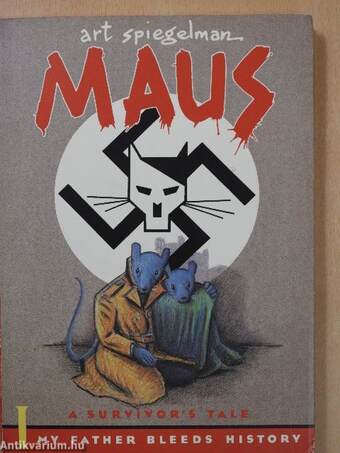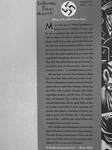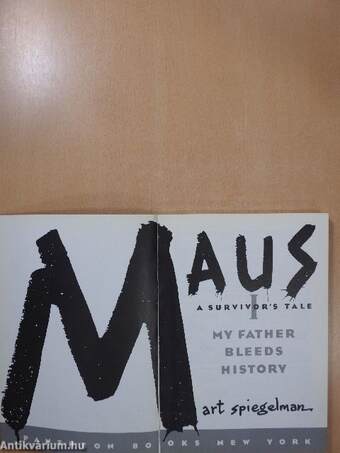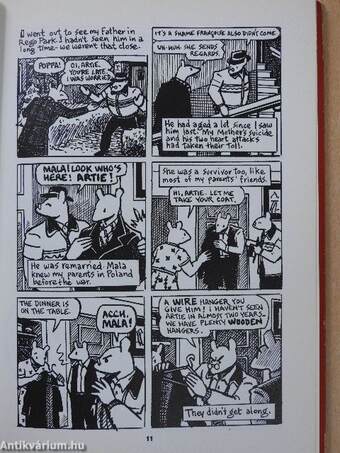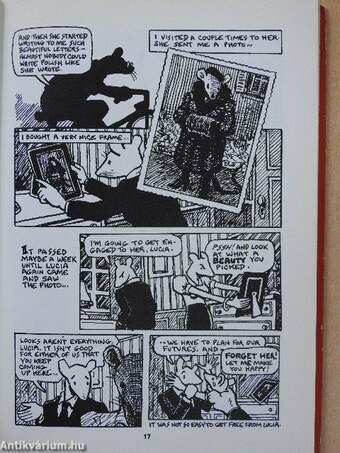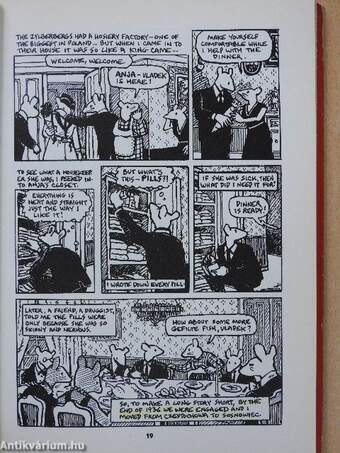1.069.222
kiadvánnyal nyújtjuk Magyarország legnagyobb antikvár könyv-kínálatát

VISSZA
A TETEJÉRE
JAVASLATOKÉszre-
vételek
Maus I.
A Survivor's Tale: My Father Bleeds History/Fekete-fehér képregény
| Kiadó: | Pantheon Books |
|---|---|
| Kiadás helye: | New York |
| Kiadás éve: | |
| Kötés típusa: | Fűzött papírkötés |
| Oldalszám: | 159 oldal |
| Sorozatcím: | |
| Kötetszám: | |
| Nyelv: | Angol |
| Méret: | 23 cm x 17 cm |
| ISBN: | 0-394-74723-2 |
| Megjegyzés: | Fekete-fehér képregény. |
naponta értesítjük a beérkező friss
kiadványokról
naponta értesítjük a beérkező friss
kiadványokról
Fülszöveg
Tökrvs
$14.00 U.S.A. $18.50 Can.
Winner of the 1992 Pulitzer Prize
aus is the story of Vladek Spieselman, a ewish survivor of Hitler's Europe, and his son, a cartoonist who tries to come to terms with his father, his father's terrifying story, and History itself. Its form, the cartoon (the Nazis are cats, the Jews mice), succeeds perfectly in shocking us out of any lingering sense of familiarity with the events described, approaching, as it does, the unspeakable through the diminutive. It is, as the New York Times Book Review has commented, "a remarkable feat of documentary detail and novelistic vividness .an unfolding literary event."
Moving back and forth from Poland to Rego Park, New York, Maus tells two powerful stories: The first is Spiegelman's father' s account of how he and his wife survived Hitler's Europe, a harrowing tale filled with countless brushes with death, improbable escapes, and the terror of confinement and betrayal. The second is the author's tortured... Tovább
Fülszöveg
Tökrvs
$14.00 U.S.A. $18.50 Can.
Winner of the 1992 Pulitzer Prize
aus is the story of Vladek Spieselman, a ewish survivor of Hitler's Europe, and his son, a cartoonist who tries to come to terms with his father, his father's terrifying story, and History itself. Its form, the cartoon (the Nazis are cats, the Jews mice), succeeds perfectly in shocking us out of any lingering sense of familiarity with the events described, approaching, as it does, the unspeakable through the diminutive. It is, as the New York Times Book Review has commented, "a remarkable feat of documentary detail and novelistic vividness .an unfolding literary event."
Moving back and forth from Poland to Rego Park, New York, Maus tells two powerful stories: The first is Spiegelman's father' s account of how he and his wife survived Hitler's Europe, a harrowing tale filled with countless brushes with death, improbable escapes, and the terror of confinement and betrayal. The second is the author's tortured relationship with his aging father as they try to lead a normal life of minor arguments and passing visits against a backdrop of history too large to pacify. At all levels, this is the ultimate survivor's tale — and that, too, of the children who somehow survive even the survivors.
Part I of Maus takes Spiegelman's parents to the gates of Auschwitz and him to the edge of despair. Put aside all your preconceptions. These cats and mice are not Tom and Jerry, but something quite different. This is a new kind of literature.
A brutally moving work of art." — Boston Globe
aus is a book that cannot be put down, truly, even to sleep. When two of the mice speak of love, you are moved, when they
suffer, you weep. Slowly through this little tale comprised of suffering, humor and life's daily trials, you are captivated by the language of an old Eastern European family, and drawn into the gentle and mesmerizing rhythm, and when you finish Maus, you are unhappy to have left that magical world and long for the sequel that will return you to it." — Umberto Eco
Art S
gj!r-^H is co-founder/editor of S '!!^"I-- S /?aw, the acclaimed maga-f-rr- zine or avant-garde comics
and graphics. His work has been published in
the
New York Times, Playboy, the Village Voice, and many other periodicals, and his drawings have been exhibited in museums and galleries here and abroad. Honors he has received for Maus include a Guggenheim fellowship, and nomination for the National Book Cri
tics Circle Award. Mr. Spiegelman lives in New York City with his wife, Francoise Mouly, and their daughter, Nadja.
Pantheon Books, New York 1/92 Printed in the U.S.A. © 1992 Random House, Inc. Vissza
Témakörök
- Idegennyelv > Idegennyelvű könyvek > Angol > Szépirodalom > Megtörtént bűnügyek, dokumentumregények
- Idegennyelv > Idegennyelvű könyvek > Angol > Szépirodalom > Regény, novella, elbeszélés
- Idegennyelv > Idegennyelvű könyvek > Angol > Folyóiratok, újságok
- Idegennyelv > Idegennyelvű könyvek > Angol > Történelem > Egyéb
- Szépirodalom > Regény, novella, elbeszélés > Tartalom szerint > Történelmi regények > Koncentrációs táborok, holokauszt
- Folyóiratok, újságok > Képregények > Idegennyelvű kiadványok > Történelem > Fekete-fehér
- Folyóiratok, újságok > Képregények > Történelmi > Fekete-fehér
- Történelem > Idegennyelvű > Angol
- Történelem > Legújabb kor > II. világháború > Holokauszt
- Szépirodalom > Regény, novella, elbeszélés > Tartalom szerint > Életrajzi regények > Önéletrajzok, naplók, memoárok
- Szépirodalom > Megtörtént bűnügyek, dokumentumregények
Art Spiegelman
Art Spiegelman műveinek az Antikvarium.hu-n kapható vagy előjegyezhető listáját itt tekintheti meg: Art Spiegelman könyvek, művekMegvásárolható példányok
Nincs megvásárolható példány
A könyv összes megrendelhető példánya elfogyott. Ha kívánja, előjegyezheti a könyvet, és amint a könyv egy újabb példánya elérhető lesz, értesítjük.



